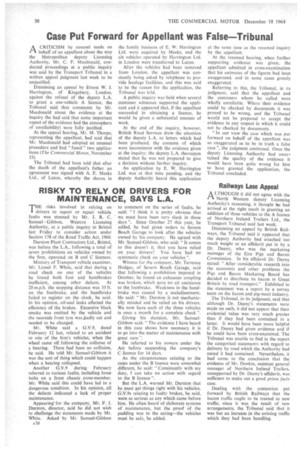Case Put Forward for Appellant was False Tribunal
Page 32

If you've noticed an error in this article please click here to report it so we can fix it.
A CRITICISM by counsel made on
behalf of an appellant about the way the Metropolitan deputy Licensing Authority, Mr. C. F. Macdonald, conducted proceedings at a public inquiry was said by the Transport Tribunal in a written appeal judgment last week to be unjustified.
Dismissing an appeal by Ernest W. J. Harrington, of Kingsbury, London, against the refusal of the deputy L.A. to grant a one-vehicle A licence, the Tribunal said that comments by Mr. Macdonald about the evidence at the inquiry (he had said that some important aspect of the evidence had the atmosphere of unreliability) were fully justified.
At the appeal hearing, Mr. M. Thorpe, representing the appellant, had said that Me. Macdonald had adopted an unusual procedure and had " fused " two applications (The Commercial Motor, November 13).
The Tribunal had been told that after the death of the appellant's father an agreement was signed with A. E. Meeks Ltd., of Luton, whereby the shares in the family business of E. W. Harrington Ltd. were acquired by Meeks, and the six vehicles operated by Harrington Ltd. in London were transferred to Luton.
After the vehicles had been removed from London, the appellant was constantly being asked by telephone to pro'vide haulage facilities, and this was said to be the reason for the application, the Tribunal was told.
A public inquiry was held when several customer witnesses supported the applicant and it appeared that, if the appellant succeeded in obtaining a licence, he would be given a substantial amount of work.
At the end of the inquiry, however, British Road Services drew the attention of the deputy L.A. to letters which had been produced, the contents of which were inconsistent with the evidence given at the inquiry; the deputy L.A. thereupon stated that he was not prepared to give a decision without further inquiry.
An application by E. W. Harrington Ltd. was at that time pending, and the deputy Authority heard this application at the same time as the resumed inquiry by the appellant.
At the resumed hearing, when further supporting evidence was given, the appellant admitted in cross-examination that his estimates of the figures had been exaggerated, and in some cases grossly exaggerated.
Referring to this, the Tribunal, in its judgment, said that the appellant and the customers whom he called were wholly unreliable. Where their evidence could be checked by documents it was proved to be wrong, and the Tribunal would not be prepared to accept the' evidence in any respect in which it could not be checked by documents.
"In our view the case which was put forward on behalf of the appellant was so exaggerated as to be in truth a false case ", the judgment continued. Once the deputy Licensing Authority had ascer-P tamed the quality of the evidence it would have been quite wrong for him to have granted the application, the Tribunal concluded.








































































































